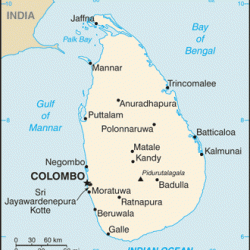On May 9 of this year, Sri Lankan Prime Minister Mahinda Rajapaksa was forced to resign his position. This is despite the fact this his brother, Gotabaya, is the President of the nation. He is part of a quasi-dynastic Rajapaksa family, which has dominated Sri Lankan politics for 20 years. The nation is in economic turmoil and that day was one of the most violent of its history. Sri Lanka has less than $1 million in foreign reserves, dwindling medical supplies and almost no fuel. President Gotobaya Rajapaksa is attempting to hold onto power as the nation continues to deteriorate. And the protests continue.
We will explore the political and economic crisis that roils the island nation. What role do outside powers and lenders play at exacerbating Sri Lanka’s economic crisis? [ dur: 58 mins. ]
- Bhavani Fonseka is a Senior Researcher and Attorney at Law with the Centre for Policy Alternatives think tank. She is the editor of Transitional Justice in Sri Lanka: Moving Beyond Promises and the author of The Long Wait For Justice: On the chronic failures of criminal justice in Sri Lanka.
- Ambika Satkunanathan is human rights lawyer and Fellow at the Open Society Foundation. She is the author of Authoritarian (in)efficiency and the undermining of democracy in Sri Lanka, Justice in Transition-Victims, Forgiveness and Truth-Seeking in Post-War Sri Lanka and Securitisation and militarisation in Sri Lanka: A continuum.
- Ahilan Kadirgamar is Senior Lecturer at the University of Jaffna. He is the author of Rebuilding the Post-War North, and co-author of The Political Economy of the Crisis in Sri Lanka and Sri Lanka’s crisis: The disaster of economic dependency.
This program is produced by Ankine Aghassian, Doug Becker, Melissa Chiprin and Sudd Dongre.
Podcast: Play in new window | Download (Duration: 58:01 — 53.1MB) | Embed
Subscribe: Apple Podcasts | Spotify | RSS
